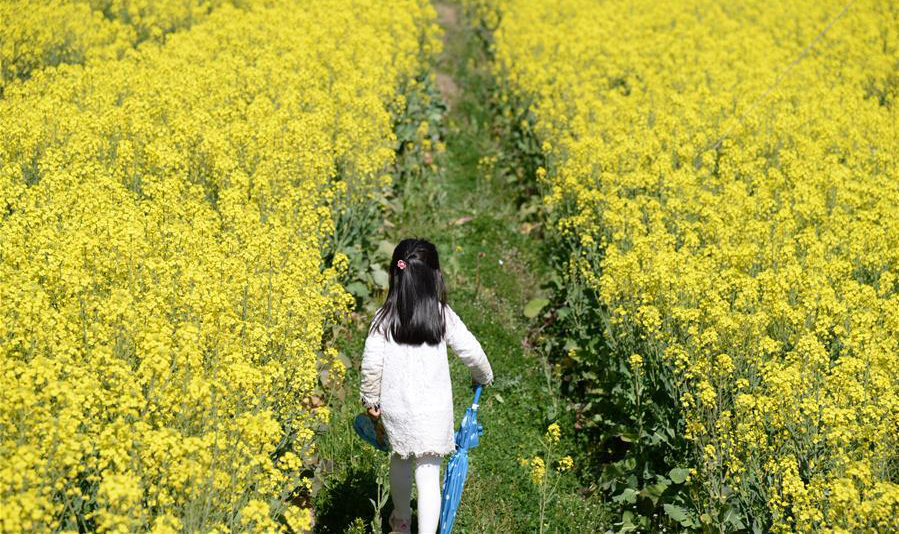Academics: Document points to clearer direction of rural development

A girl plays in blooming rape flowers in Qinglong Town of Anning, Southwest China's Yunnan Province, on Feb. 19, 2017. The growth of tourism will be a crucial breakthrough to rural development, scholars said when weighing in on the recently published No.1 Central Document that focused on rural issues.
Commenting on a recent central government document on agriculture, farmers and rural areas, scholars said that it captures the essence of rural issues, extends the agricultural industrial and value chains, consolidates the basis for shared rural development, and further unleashes the endogenous momentum of agricultural and rural development.
The Opinions of the CPC Central Committee and the State Council on Advancing Agricultural Supply-Side Structural Reform and Accelerating the Cultivation of New Engines for Agricultural and Rural Growth, the No. 1 Central Document for 2017, was promulgated on Feb. 5. This is the 14th year in a row that the "No. 1 Central Document" has been devoted to agriculture, farmers and rural areas.
Keeping abreast with the times, the document proposed a series of new policy measures, such as building “a functional area for grain production, a protective area for important agricultural products and an advantageous area for distinctive farm products,” “a modern agricultural industrial park, a science and technology park, and an entrepreneurial park,” and “a rural complex.”
Scholars regarded the “Three Areas, Three Parks and One Complex” policy as a highlight of the central document. Zhang Xiaoshan, a CASS Member and research fellow from the Rural Development Institute at the Chinese Academy of Social Sciences (CASS), pointed out that the central government signaled its commitment to agriculture, rural areas and farmers by highlighting rural issues as a core theme of the central document for several consecutive years.
The building of the “Three Areas, Three Parks and One Complex” will further activate elements for rural development, breed new highlights of future agricultural growth and speed up the development of modern agriculture, Zhang said.
The “Three Areas and Three Parks” proposal reflects the central government’s resolve to optimize the agricultural structure, improve the quality of farm products, and expedite the construction of rural industrial clusters and innovative highlands, said Zhang Junbiao, a professor from the College of Economics and Management at Huazhong Agricultural University.
The “rural complex” concept is indicative of the government’s attention to the multi-functionality of agriculture, Zhang Junbiao said. It will not only be economically functional for agricultural production and farm product output but also serve ecological, recreational and cultural purposes to diversify the model of agricultural development.
“The development of tourism and aged services will be a crucial breakthrough to increasing farmers’ incomes in the future,” said Zhang Fengtian, a professor from the School of Agricultural Economics and Rural Development at Renmin University of China.
In recent years, China has actively explored ways to achieve agricultural transformation, structural adjustment and reform, laying the groundwork for further agricultural upgrading. Nonetheless, some problems remain prominent, including imbalanced supply and demand of agricultural products and irrational factor allocation.
In this regard, the Opinions clearly stressed thoroughly carrying out agricultural supply-side structural reform and accelerating new growth engines for agricultural and rural development to achieve modernization.
Zhang Junbiao said that ensuring grain security should be the priority of agricultural supply-side structural reform to prevent drops in grain production and large supply gaps caused by yield fluctuation in major farm products.
The document also noted that agricultural supply-side structural reform is a long-term process filled with major tests, like properly handling the relationship between the government and the market and coordinating the interests of all parties.
Zhang Xiaoshan said balancing government-market relations is one of the most important guarantees for future agricultural supply-side structural reform, adding that the government should strengthen its guiding role and constantly activate market elements.
ZHANG FAN is a reporter at the Chinese Social Sciences Today.

 PRINT
PRINT CLOSE
CLOSE